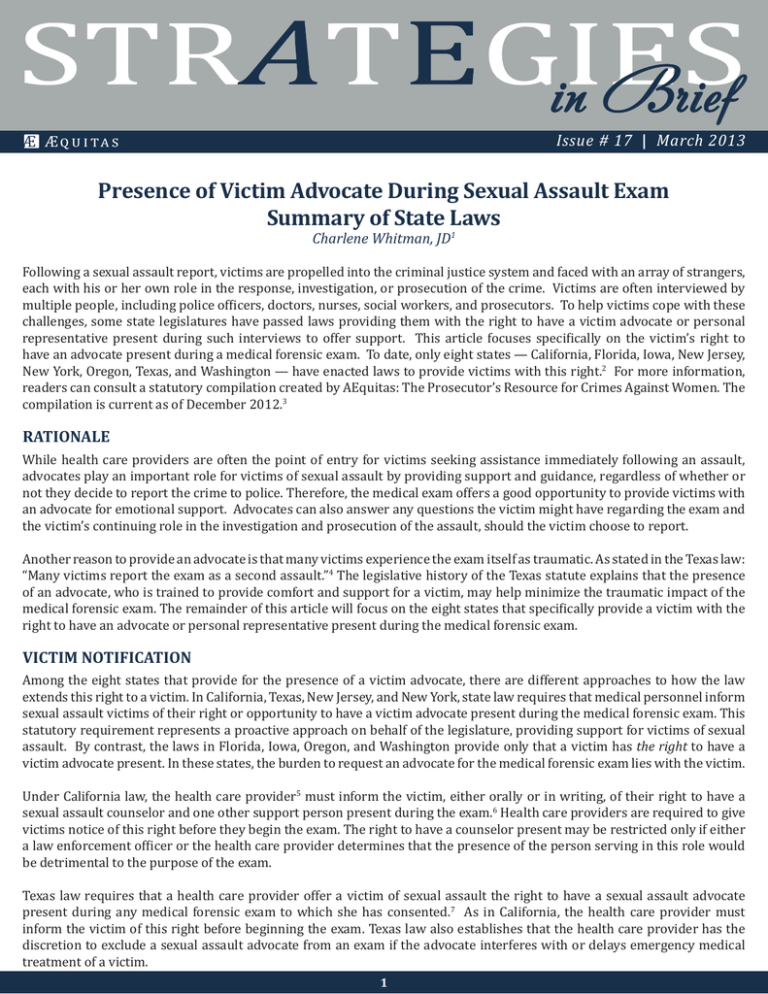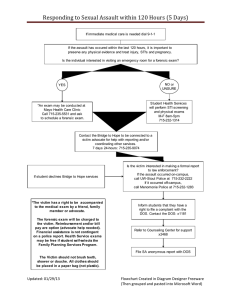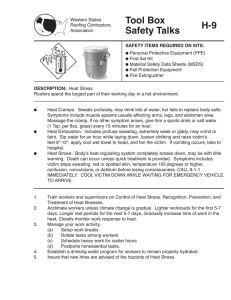
in Brief
Issue # 17 | March 2013
Presence of Victim Advocate During Sexual Assault Exam
Summary of State Laws
Charlene Whitman, JD1
Following a sexual assault report, victims are propelled into the criminal justice system and faced with an array of strangers,
each with his or her own role in the response, investigation, or prosecution of the crime. Victims are often interviewed by
multiple people, including police officers, doctors, nurses, social workers, and prosecutors. To help victims cope with these
challenges, some state legislatures have passed laws providing them with the right to have a victim advocate or personal
representative present during such interviews to offer support. This article focuses specifically on the victim’s right to
have an advocate present during a medical forensic exam. To date, only eight states — California, Florida, Iowa, New Jersey,
New York, Oregon, Texas, and Washington — have enacted laws to provide victims with this right.2 For more information,
readers can consult a statutory compilation created by AEquitas: The Prosecutor’s Resource for Crimes Against Women. The
compilation is current as of December 2012.3
RATIONALE
While health care providers are often the point of entry for victims seeking assistance immediately following an assault,
advocates play an important role for victims of sexual assault by providing support and guidance, regardless of whether or
not they decide to report the crime to police. Therefore, the medical exam offers a good opportunity to provide victims with
an advocate for emotional support. Advocates can also answer any questions the victim might have regarding the exam and
the victim’s continuing role in the investigation and prosecution of the assault, should the victim choose to report.
Another reason to provide an advocate is that many victims experience the exam itself as traumatic. As stated in the Texas law:
“Many victims report the exam as a second assault.”4 The legislative history of the Texas statute explains that the presence
of an advocate, who is trained to provide comfort and support for a victim, may help minimize the traumatic impact of the
medical forensic exam. The remainder of this article will focus on the eight states that specifically provide a victim with the
right to have an advocate or personal representative present during the medical forensic exam.
VICTIM NOTIFICATION
Among the eight states that provide for the presence of a victim advocate, there are different approaches to how the law
extends this right to a victim. In California, Texas, New Jersey, and New York, state law requires that medical personnel inform
sexual assault victims of their right or opportunity to have a victim advocate present during the medical forensic exam. This
statutory requirement represents a proactive approach on behalf of the legislature, providing support for victims of sexual
assault. By contrast, the laws in Florida, Iowa, Oregon, and Washington provide only that a victim has the right to have a
victim advocate present. In these states, the burden to request an advocate for the medical forensic exam lies with the victim.
Under California law, the health care provider5 must inform the victim, either orally or in writing, of their right to have a
sexual assault counselor and one other support person present during the exam.6 Health care providers are required to give
victims notice of this right before they begin the exam. The right to have a counselor present may be restricted only if either
a law enforcement officer or the health care provider determines that the presence of the person serving in this role would
be detrimental to the purpose of the exam.
Texas law requires that a health care provider offer a victim of sexual assault the right to have a sexual assault advocate
present during any medical forensic exam to which she has consented.7 As in California, the health care provider must
inform the victim of this right before beginning the exam. Texas law also establishes that the health care provider has the
discretion to exclude a sexual assault advocate from an exam if the advocate interferes with or delays emergency medical
treatment of a victim.
1
Issue #17 • March 2013
Similarly, New Jersey and New York require that the health care provider notify a victim of sexual assault of the opportunity
and availability for an advocate to be present during the medical exam.8 New Jersey law assigns this responsibility to the
Sexual Assault Nurse Examiner program coordinator to provide “the opportunity to … speak with a rape care advocate prior
to and during any medical procedure”.9 New York requires that, upon admittance or commencement of treatment that the
hospital “shall advise the victim of the availability of the services of a local rape crisis or victim assistance organization, if any,
to accompany the victim through the sexual offense examination.”10 Both New Jersey and New York provide for an exception
where emergency medical care is necessary.
NO NOTIFICATION REQUIRED
The laws of Florida, Iowa, Oregon, and Washington have established the victim’s right to have an advocate present during
the medical forensic exam, but do not specifically require the medical professional to notify the victim of this right. Florida
law provides for the presence of a victim advocate during any medical forensic exam upon the request of the victim or the
victim’s parent, guardian, or lawful representative.11 When requested to do so, the health care provider is required to permit
an advocate from a certified rape crisis center to attend any medical forensic exam.
Iowa allows a victim counselor to be present during any “proceeding related to the offense.”12 The statute defines any
“proceeding related to the offense” to include exams of the victim for injuries related to the charged offense at an emergency
medical facility where surgery is not required. Additionally, the role of victim counselor is defined as a certified counselor
who works at a crime victim center, and whose primary purpose is to render advice, counseling, and assistance to the victims
of crime.13 Going one step further than the Florida law, Iowa’s statute provides that a victim counselor who is present at the
request of the victim shall not be denied access to any proceedings related to the offense.14
Oregon law provides for any victim over the age of 15 to request an individual to be his or her “personal representative.”15
This personal representative may accompany the victim throughout the various stages of the investigation and prosecution,
including a medical forensic exam. Oregon, like Iowa, prohibits health care providers from preventing a personal representative
from accompanying a victim unless the representative’s presence would somehow compromise the exam.16 This Oregon
statute also governs the effect of the admissibility of evidence related to the presence of a victim advocate. Specifically,
the law states that there are no grounds for excluding otherwise admissible evidence based on whether or not a personal
representative was allowed to be present during a medical forensic exam. Additionally, the fact of whether or not a victim
requested a personal representative to be present during the exam may not be used as evidence in a criminal case.
Finally, Washington state law permits a personal representative of the victim’s choice to accompany the victim to the hospital
or other health care facility and to be present during the sexual assault exam.17 This law is part of the Victims of Sexual
Assault Act, which states that: “because of the lack of information, training, and services, the victims of sexual assault are
not receiving the assistance they require in dealing with the physical and psychological trauma of sexual assault.”18 The
Victims of Sexual Assault Act was enacted to provide education and services to victims throughout the process of a criminal
investigation and prosecution and to serve the long-term goals of victim recovery and crime prevention.
CONCERNS AND CAUTIONS
While the presence of an advocate (or a personal representative) during a medical forensic exam can be very helpful for
victims, there are some concerns from a prosecutor’s perspective. For example, some prosecutors are concerned that the
presence of a victim advocate might defeat patient-doctor privilege. Others question whether the victim’s privacy interests
are being protected. Many states address these concerns by providing for legal privilege between the victim and an advocate,
counselor or representative, at least within the context of a sexual assault case. This legal privilege means that a victim
advocate, counselor, or representative many not be compelled to testify to or disclose communications with the victim, made
in a professional capacity.19 Of the eight states that have codified the right to have a victim advocate present during the medical
forensic exam, seven (California, Florida, Iowa, New Jersey, New York, Texas and Washington) also have laws protecting this
privilege of communication between a victim of sexual assault and their advocate, counselor or representative.
2
Issue #17 • March 2013
CONCLUSION
It is critical to offer services to sexual assault victims as soon as possible. Allowing for an advocate to be present during
the medical forensic exam provides immediate support and also presents the opportunity for victims to be informed of
additional resources that are available to them to assist in their recovery. Therefore, it is considered best practice to offer
victims the option of having an advocate present during a medical forensic exam, regardless of whether there is a statutory
requirement. This best practice is recommended in the National Protocol for Sexual Assault Medical Forensic Examinations20
as well as many state protocols for sexual assault response. The National Protocol calls for victim-centered care during the
exam process, and specifically recommends that the nurse examiner “understand the importance of victim services within
the exam process [and] involve victim service providers/advocates in the exam process (including the actual exam) to offer
support, crisis intervention, and advocacy to victims, their families, and friends.”21
The legislatures of California, Florida, Iowa, New Jersey, New York, Oregon, Texas, and Washington have provided a valuable
legal tool for victim advocates and health care providers to offer guidance and support for victims of sexual assault. For the
full text of these state laws and other legal issues faced by advocates and victims of sexual assault please see http://www.
aequitasresource.org/library.cfm.
ENDNOTES
Charlene Whitman is an Associate Attorney Advisor at AEquitas: The Prosecutors’ Resource on Violence Against Women. This article has been revised, since its
original publication, to reflect changes in the law.
1
These eight states also ensure the right to have a victim advocate present during other proceedings within the criminal context. In fact, this is true for the majority of U.S. states, which provide for sexual assault victims to have an advocate present at any interview with police or prosecutors. However, a review of the laws
addressing this right is beyond the scope of this article.
2
3
4
This and other resources are available upon request at http://www.aequitasresource.org/library.cfm.
Commentary in support of Tx. B. An., H.B. 1234, May 2, 2001.
This article uses the term “health care provider.” For state-specific terminology (and a definition of which personnel are included in the definition), see the law
and practices for your jurisdiction.
5
6
Cal. Pen. Code § 264.2(b).
8
N.J. Stat. Ann. § 52:4B-52(h)(2011); N.Y. Pub. Health Law § 2805-I(3)(2012).
7
9
10
11
12
13
14
15
16
17
18
Texas Code Crim. Proc. Ann. Art. 56.045
N.J. Stat. Ann. § 52:4B-52(h)(2011).
N.Y. Pub. Health Law § 2805-I(3)(2012).
Fla. Stat. Ann. § 960.001(1)(u).
Iowa Code Ann. § 915.20(1).
Iowa Code Ann. § 915.20(1)(a).
Iowa Code Ann. § 915.20(2).
OR. Code §147.425.
Id.
Wash. Rev. Code Ann. § 70-125.060.
Wash. Rev. Code Ann. § 70.125.020.
For more information, AEquitas has created a statutory compilation titled, Victim Privilege by Practitioner, which is current as of July 2010 and available, upon
request, at http://www.aequitasresource.org/library.cfm.
19
Office on Violence Against Women, United States Department of Justice (2004, September). A National Protocol for Sexual Assault Medical Forensic Examinations
(Adults/Adolescents). Washington DC (NCJ 206554).
20
21
Id.
© 2013 AEquitas. All rights reserved.
Updated and reprinted with permission from Sexual Assault Report, Volume 14, Number 6 (July/August 2011), published by Civic Research Institute. All Rights
Reserved. This article was supported by Grant No. 2009-TA-AX-K024 awarded by the U.S. Department of Justice, Office on Violence Against Women (OVW). The opinions
findings, conclusions, and recommendations expressed in this publication are those of the author and do not necessarily reflect the views of OVW.
1100 H Street NW, Suite 310 • Washington, DC 20005
P: 202-558-0040 • F: 202-393-1918
3



